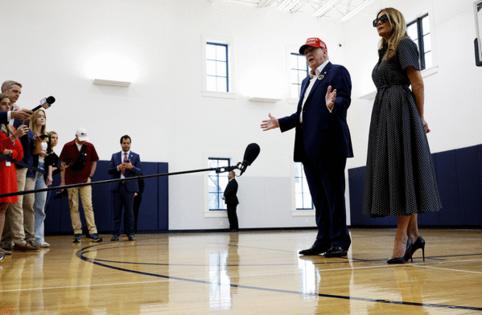Editorial: With five words, Trump kills a free-press measure that had bipartisan support
Published in Political News
The apparent death of the PRESS Act in Congress should alarm Americans on two levels.
One, the measure — acronym for Protect Reporters from Exploitative State Spying— seeks to shield a vibrant free press from coercive government intrusion.
But, two, even those who fail to understand the necessity of an uncowed press to the health of a functioning democracy should pause at the mechanism of this legislation’s demise: After this bill unanimously passed a Republican-controlled House — a testament to its commonsense defense of First Amendment principles that protect Americans of all political persuasions — all it took to ensure its demise in the Senate was a one-line social media outburst from a president-elect: “REPUBLICANS MUST KILL THIS BILL!”
That Donald Trump wants the PRESS Act dead is hardly surprising. The very impetus for the bipartisan bill was his sustained, un-American attack against the media when he last occupied the White House. But the fact that, by typing five words on his Truth Social network last week, Trump was able to ensure that the bill’s Republican supporters would shrug and give up should be terrifying even to those who don’t revere a free press. This isn’t how America’s checks-and-balances government is supposed to work.
Trump has been blunt in voicing his disdain for the free press throughout his decade on the national political stage. His frequent declaration that journalists are “the enemies of people” is an outright Stalinist construct.
And it wasn’t just talk. Trump, obsessed with plugging leaks to the media during his first term as president, ordered the secret seizure of private communications by journalists at The New York Times, The Washington Post, CNN and other news outlets. When that activity later came to light, the Biden administration’s Justice Department banned prosecutors from using such heavy-handed tactics.
The PRESS Act would codify those limitations in federal law so future administrations couldn’t just discard them. It would impose specific restrictions on the government’s power to seize private data from journalists or force them to reveal sources.
Although the act’s creation stems from Trump’s anti-press abuses, the measure found deep support from congressional conservatives — who, after all, have made online free speech a central part of their culture-war crusades. Key proponents have included such stalwart Trump supporters as Rep. Jim Jordan, R-Ohio, and Sen. Lindsey Graham, R-S.C.
The measure unanimously passed the House in January. Its passage in the Senate was widely viewed as similarly assured. That is, until last Wednesday, when Trump took to his social media platform.
He linked to a PBS “NewsHour” interview with the CEO of the Committee to Protect Journalists, urging Senate passage. Trump’s one-line, capitalized decree alongside the link — “REPUBLICANS MUST KILL THIS BILL!” — didn’t bother with any discussion of why, in his view, the Senate should kill the bill.
It wasn’t a debate or even the airing of an opinion; it was a summary order from an incoming president to a supposedly co-equal branch of government.
And that’s all it took. The bill’s House sponsor, Rep. Kevin Kiley, R-Calif., issued a statement the next day saying, “It’s clear we have work to do to achieve consensus on this issue” — as if the overwhelming consensus of a unanimous House vote now means nothing.
As a practical matter, Trump’s opposition does in fact kill the measure, despite the fact that he’s not even in office yet and despite the previous bipartisan support for the bill.
That’s not the way America’s system of government is supposed to work, but it’s the way today’s Republican Party works. Regardless of the merits of the bill, the GOP’s Trump supporters in the Senate will never allow it to go forward now that he has issued his five-word command.
It’s reminiscent of how Trump summarily killed border reform earlier this year because he wanted a campaign issue rather than a solution. Then, as now, congressional Republicans turned their backs on the best interests of the nation to do Trump’s self-focused bidding.
Trump has been blunt about his plans to attack the free press in his second term, which, he has said, could include going after the broadcast licenses of news organizations and even jailing journalists. Those who would shrug off such threats as typical Trumpian bluster should consider that, even prior to taking office, he is able to lay the groundwork for such attacks with a mere social media post ordering congressional Republicans around.
That’s a danger not just to the free press but to the very concept of separated powers.
©2024 STLtoday.com. Distributed by Tribune Content Agency, LLC.




























































Comments